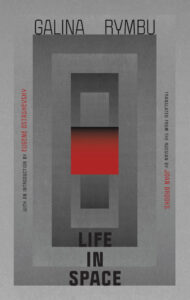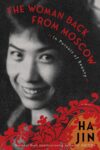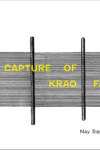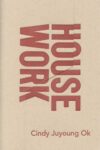
[Ugly Duckling Presse; 2020]
Tr. from the Russian by Joan Brooks
Galina Rymbu’s first collection of poetry in English, Life In Space brings together work written over the last decade for Russian chapbooks, journals, and websites. Here, Rymbu offers up a life not in outer space, but in the terrestrial, elemental spaces of the ravaged former Second World: an oil refinery in Siberia, a subway station, a protest, a dorm room, more factories, a shop, a cemetery, a bed. Within a few pages we realize we’re in the hands of a radical and a visionary: “I see you fire / I love you fire / knowledge rage emotion and fire / for those who have occupied our reality prison and fire.”
Born in Omsk in 1990, Rymbu describes her childhood as post-Soviet apocalyptic:
When I was a child, I didn’t feel like I was living in a world that was principally different from the late Soviet period . . . . [Yet] I’m sure no workers’ children went hungry in the 1970s and 1980s. I grew up in a factory settlement in Omsk, in Siberia, and when I went to school, I often saw workers’ children faint from hunger during class (from an interview with her translator Joan Brooks).
This is the world of her poems, too; in “my father sleeps on the floor” she writes, “my father sleeps on the floor, and we’re waiting / for his paycheck, like a miracle, like the messiah, like when I was little, like the end of the world, / when we’ll all eat ourselves sick and die.”
Yet the end of the world in Rymbu’s poems is a space-time for life and for growth as well as for death. Moving from youthful publications in local Omsk journals to leading Russian literary platforms in the space of a few years (she worked closely for a while with the circle behind the St. Petersburg journal [Translit]; her third book of poems, also titled Life in Space, came out with the prestigious Moscow Novoe literaturnoe obozrenie, or New Literary Review), Rymbu has been recognized since the mid 2010s by one cultural arbiter after another as the leading voice in Russian poetry of her generation. She has held that position since, and added an international readership stretching from Siberia to San Francisco. Her poems in English have appeared widely online over the past five years. In December of 2020 she was profiled in Time magazine, along with other members of the “F pis’mo” feminist writing collective, which she founded. With poems like the untitled “the dream is over, Lesbia, now is the time for sorrow,” we see how she captured the imagination of the Russian literary scene:
o, Lesbia, the time of war has come,
time to buy guns from stalky dudes
and hide a blade or a shiv in your macbook case
and move with clenched teeth through the dark fascist ranks.
Here, as elsewhere, Rymbu’s poetry highlights gender and sexuality as central to understanding her region’s histories and contemporary possibilities for cultural and political change, working through classical references, sliding pronouns, oblique treatment of grammatical gender in Russian, and formal play. Rymbu’s gender politics inspire her doubled critique: of the neoliberal global present from its left margin; and of much of the Left from feminist sidelines. Her elemental voice — the cooler Romantic lyricism forged in a dis-individuated but extremely intimate poetic subjectivity — is fresh, queer, and dangerous.
The poems, tempting to tear through in a single sitting, haul the reader’s breath and body toward divination like nothing we’ve read in a long time. You come away with the sense of the smallness of literary wars and Cold Wars alike, but never a shrinking from the battle for dignity, collectivity, and a livable life. What matters here is bread, blood, bodies attempting to couple in ravaged space, a reoriented “phenomenology of perception of the political,” in Rymbu’s words. In “there is a monster living in my ovary,” she writes
before going to bed my son shined the phone’s flashlight on my stomach.
he thinks we can build a rocket and fly off into space,
and I can’t explain to him that space only exists for the select few
[. . .]
that the cosmic buildings people are already building here, on earth,
and the robot exhibits he loves so much,
and complex gadgets the new poets have for the production of machine poetry
are only made for the few, in the name of the few
The voice that guides us from poem to poem — trying on forms, line lengths, more or less direct utterance — always comes back to them, sometimes them:no one in post-Soviet Russia would dare say “the people,” except maybe Galina Rymbu. In “only our neighborhood had so many factories” she puts in bluntly: “. . . you have nothing but a desire to speak in another way / but with them / in their language.” She writes for a people she refuses to condescend to: “It can seem like the oppressed have a simple language, that we should employ a series of reductions to work with this language in order to be comprehensible as poets and artists. But there is no such thing as a simple language.” Instead, she argues, the language of the oppressed is a “rat’s nest of complexity made up of the languages of violence, ideological pressures, propaganda, biopolitical manipulations, survivals of the past, fantasies, hopes, and even certain seeds of ‘emancipation’ . . . ” Rymbu’s frozen utopias, fiery refineries, crashing celestial bodies offer a flight-map, a conviction that poetry will be our door to the language, thought, and communion of freedom.
What is perhaps most shocking to us in 2021 is the unapologetic Romanticism of Life in Space, with its alacrity and wildness, as well as a Blakean reach and an affinity for the casual brutality of strangers’ speech when each recognizes the pain of the other. If the speaker and subjects suffer differently, they also fight and commune under shared conditions of extractive labor and landscapes emptied of recognizable forms of life. An archipelago of absences grounds meaning conjured from spiritual and material detritus. In “Time of the Earth,” Rymbu writes
figures evenly distributed in
organic anticipation of an empty surface;the pines like monotonous drills screw into the earth,
organizing the gaze; the slots of horizons, filled up with clay; figures
become the ground of travel, in one
movement beyond sense
The crashing of objects into spaces left behind awakens historical scars:
abandoned excavation sites covered in snow; in the settlement, in some
backyard something butchered cries out residually; but whoever did the
chopping is absent, there’s only the residue of one who looks, not
communing with the other figures
Rymbu writes from a towering vantage, a birds-eye view of those excavation sites, whole smoking factories, whole cities in flames, whole historical trajectories. Uniquely, she also writes from a position of the greatest intimacy, sleeping on the floor with a child and a fellow revolutionary, smoking a cigarette in the cold while sifting through the trash on the ground. With good reason, perhaps, many contemporary poets seem reluctant to shoulder such expansiveness or to offer historical judgment. Yet Rymbu rises to the heights of vision and sinks to the depths of sensation, in a way that reminds us — in some ways — of Aimé Césaire “at the end of the end of the small hours” in his Cahier d’un retour au pays natal, reliving the minutiae of his childhood and condemning the entire ruinous project of Europe — or of Caspar David Friedrich’s iconic “wanderer” outlined above a sea of mist, but turned, fixing us in a flashing gaze.
A long tradition of Russian radical poetry bristles and stands behind her, but so too a globe of nomadic, emigrant women artists and writers, who are still striving to create a world they can live in. Unlike, say, Anne Boyer, whose collection Garments Against Women reveals the agony of medium, of institutions, of language — Rymbu has less ambivalence. She — and the young people she speaks for — stole it: online, in pirate translations from shadow libraries; on the streets from mentors, lovers, and faithless friends; while breastfeeding and cleaning the floor and pleading on social media for healthcare and medication.
Rymbu translates savagely well for this reason, winging across language, culture, and degrees of precarity. Brooks’ English grows and bleeds in response to the original, performing not only a transubstantion but a conversion, an answering echo to Rymbu’s call. It’s true here too — and here — and here, Rymbu’s readers call back to her from afar. As an anonymous poet scrawled in uneven lines of graffiti glimpsed elsewhere in the former Second World: If the revolution is not feminist, it will not be.
Marijeta Bozovic is an Assistant Professor of Slavic Languages and Literatures, affiliated with Film and Media Studies and Women’s, Gender, and Sexuality Studies at Yale University. She is the co-editor of Russian Literature; associate editor of ASAP/Journal; film and media editor for Slavic Review. She is currently finishing a book project on Avant-Gardes Post: Radical Poetics After the Soviet Union.
Anjuli Raza Kolb is a poet, essayist, translator, critic and professor of English at the University of Toronto where she teaches postcolonial literature and theory and poetry. Her book Epidemic Empire: Colonialism, Contagion, and Terror, 1817-2020, is out from the University of Chicago Press and her work has appeared in many venues.
Lindsay Turner is a poet, critic, and translator. Her poetry collection Songs & Ballads was published in 2018 by Prelude Books and her translations from the French include books by Stéphane Bouquet, Souleymane Bachir Diagene, Anne Dufourmantelle, and Ryoko Sekiguchi. She is Assistant Professor in the Department of English and Literary Arts at the University of Denver.
This post may contain affiliate links.







